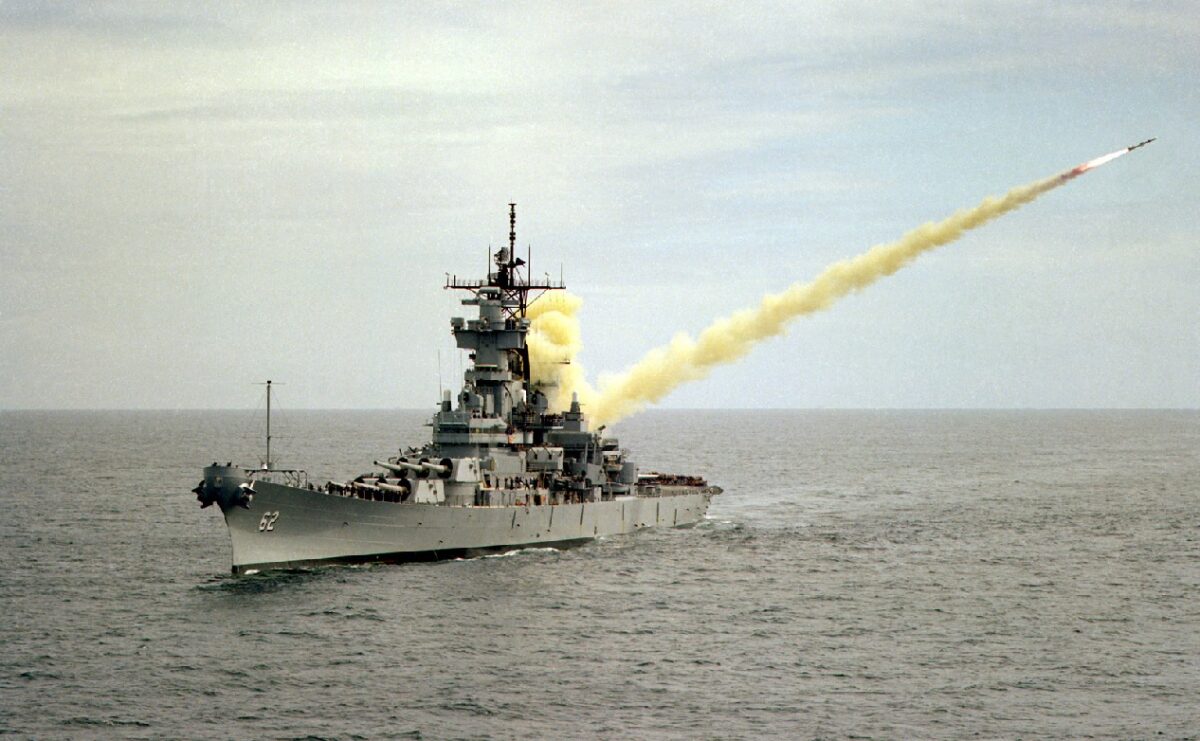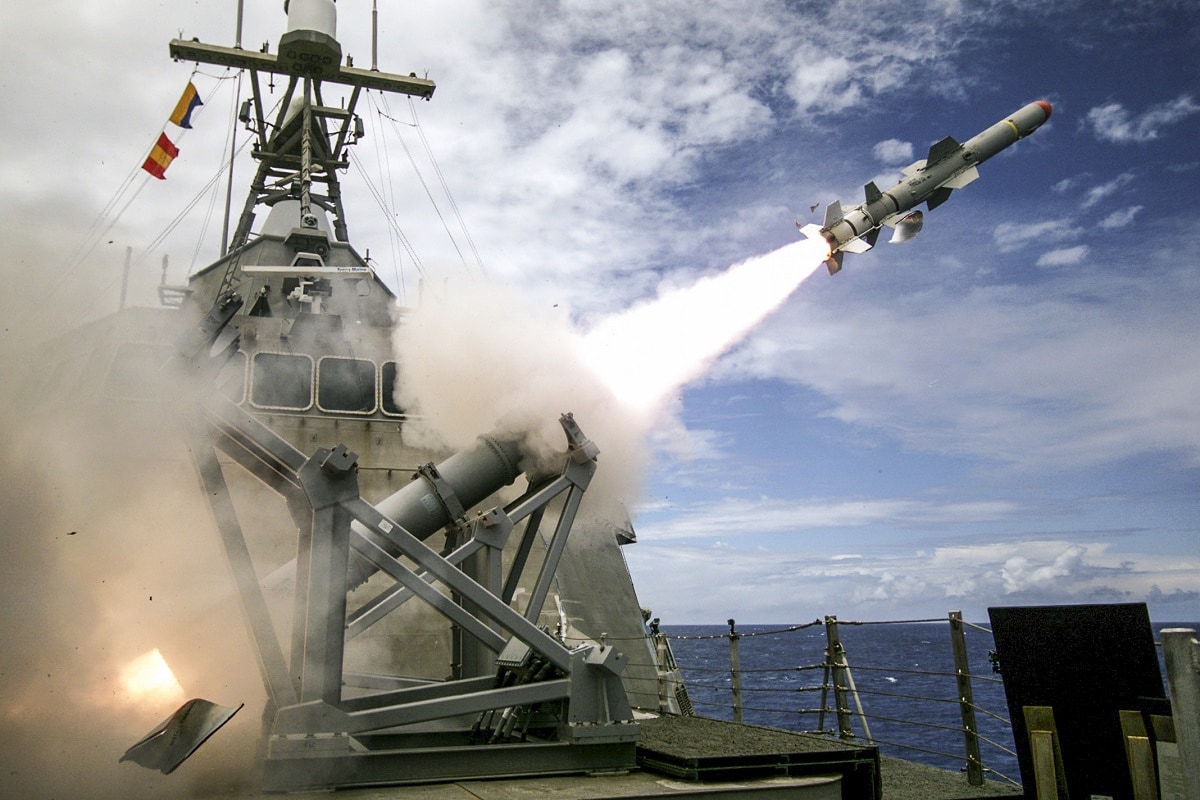Meet the Harpoon Missile: Merriam-Webster provides two definitions for the word hoary: (1) “gray or white with or as if with age;” and (2) “extremely old: ANCIENT.” So then, for the sake of alliteration, the Harpoon anti-ship missile could certainly be dubbed “The Harmful Hoary Harpoon,” in honor of another famous Triple H, that being WWE superstar Hunter Hearst Helmsley. After all, (1) it is indeed generally painted in a white color scheme, and (2) it’s been around the block a bit, having been introduced in 1975 (which, coincidentally, was also my birth year), and (3) one should definitely not equate the Harpoon’s age with lack of deadliness. Just ask Vladimir Putin.
Hryvnia for the Harmful Hoary Harpoons
The time-honored Harpoon missile is back in the news — and much to Putin’s chagrin. U.S. SECDEF Lloyd Austin announced on Monday that NATO ally Denmark pledged a quad truck-mounted launcher for Harpoon missiles as a donation to Ukraine. The Danish government made this pledge during a virtual meeting of the so-called Ukraine Defense Contact Group. The group includes more than 40 ministers and chiefs of defense including Austin and Ukrainian Minister of Defense Oleksii Reznikov. Quoth Mr. Austin “I’m especially grateful to Denmark, which announced today that it will provide a Harpoon launcher and missiles to help Ukraine defend its coast.”
Ukraine’s acquisition of the Harpoon missiles couldn’t have come at a better time, as Russia’s blockade of Odessa, Ukraine’s largest port on the Black Sea, has dragged on for over 90 days, which is threatening the global food supply. As stated by Joint Chiefs of Staff Gen. Mark Milley, “I think it’s quite important to the economy of Ukraine, and many countries in the world depend on Ukrainian grain. As for what we’re doing about it, right now we don’t have any naval assets on the Black Sea, we don’t intend to. Right now it’s a bit of a stalemate between the Ukrainians wanting to make sure there isn’t an amphibious landing around Odessa. Right now it’s a no-go for commercial shipping.”
The Harpoon will be a force multiplier for Ukraine’s coastal defense strategy, a worthwhile comrade to the proverbial ‘spear” of the Neptune missile, which in turn made headlines in its own right by sinking the Russian Navy’s Black Sea Fleet flagship Moskva. Not only that, they’ll be cost-effective too; the missile is comparatively inexpensive to produce at around 1.65 million USD (equivalent to 48.5 million Ukrainian Hryvnia), thus offering plenty of the proverbial bang for the buck (or hellfire for the Hryvnia if you prefer).
Harpoon History
As noted by my 1945 colleague Peter Suciu, “The Harpoon has been described as the world’s most successful anti-ship missile, and it is currently in service with the armed forces of more than thirty nations. It has been regularly upgraded over the years, and this has led to the development of the standoff land attack missile (SLAM) and the SLAM expanded response (SLAM-ER).” The Harpoon missile achieved its first battlefield success during the Iran-Iraq War, more specifically during Operation Morvarid in November 1980, wherein Iranian missile boats attacked and sank two Iraqi Osa-class missile boats.
Fast forward to April 1988, and now it was the Iranian Navy’s turn to be on the receiving end of the Harpoon’s deadly capabilities, courtesy of the U.S. Navy during Operation Praying Mantis when the Iranian frigate IRIS Sahand was sunk by Harpoons launched from A-6E Intruders and the guided-missile destroyer USS Joseph Strauss. The Iranians for their part launched one of their Harpoons at the guided-missile cruiser USS Wainwright but were unsuccessful in their endeavors. This was the first, and so far only, time the U.S. Navy has exchanged surface-to-surface missile fire with an enemy, and it resulted in the largest warship sunk by the U.S. Navy since WWII. Operation Praying Mantis was the largest of five major U.S. Navy surface actions since World War II.
Much like another venerable weapons system, the B-52, the Harpoon has not stood frozen in time, but rather has proven itself highly adaptable and versatile over the years. At present, more than 600 ships, 180 submarines, twelve different types of aircraft, and several land-based launch vehicles across the world are integrated with Harpoon missiles, according to Boeing. In February 2021 it was announced that Boeing began work to return the Harpoon to operational status in the U.S. Navy’s submarine force after a more than 20-year absence.
More specifically, the UGM-84A Harpoon Block 1C missiles will be integrated into the U.S. Navy’s Los Angeles-class submarines, with a projected project completion date of December 2022. Meanwhile the Block II version of the Harpoon — developed in 1998 — has already been integrated into the payloads of foreign-owned F-15 and F-16 fighter jets.
The Harpoon packs a 478-pound (221 kilograms) warhead and has a range of up to 150 nautical miles (280 kilometers), utilizing a low-level, sea-skimming cruise trajectory with active radar guidance. The air-launched missiles utilize a Teledyne turbojet/solid propellant booster for surface and submarine launch. It has a 3-foot (0.91 meters) wingspan with booster fins and wings, and measures just over 12.5 feet (3.8 meters) in length in its air-launched version, while the surface- and submarine-launched model measures 15 feet (4.6 meters).

F-15 armed with Harpoon missile.
With this combination of lethality and versatility, no wonder Mr. Putin is so upset about the Harpoon ending up in Ukrainian hands.

An aerial port bow view of the battleship USS NEW JERSEY (BB-62) launching an RGM-84 Harpoon missile on the Pacific Missile Test Center Range.
Christian D. Orr is a former Air Force officer, Federal law enforcement officer, and private military contractor (with assignments worked in Iraq, the United Arab Emirates, Kosovo, Japan, Germany, and the Pentagon). Chris holds a B.A. in International Relations from the University of Southern California (USC) and an M.A. in Intelligence Studies (concentration in Terrorism Studies) from American Military University (AMU). He has also been published in The Daily Torch and The Journal of Intelligence and Cyber Security.

